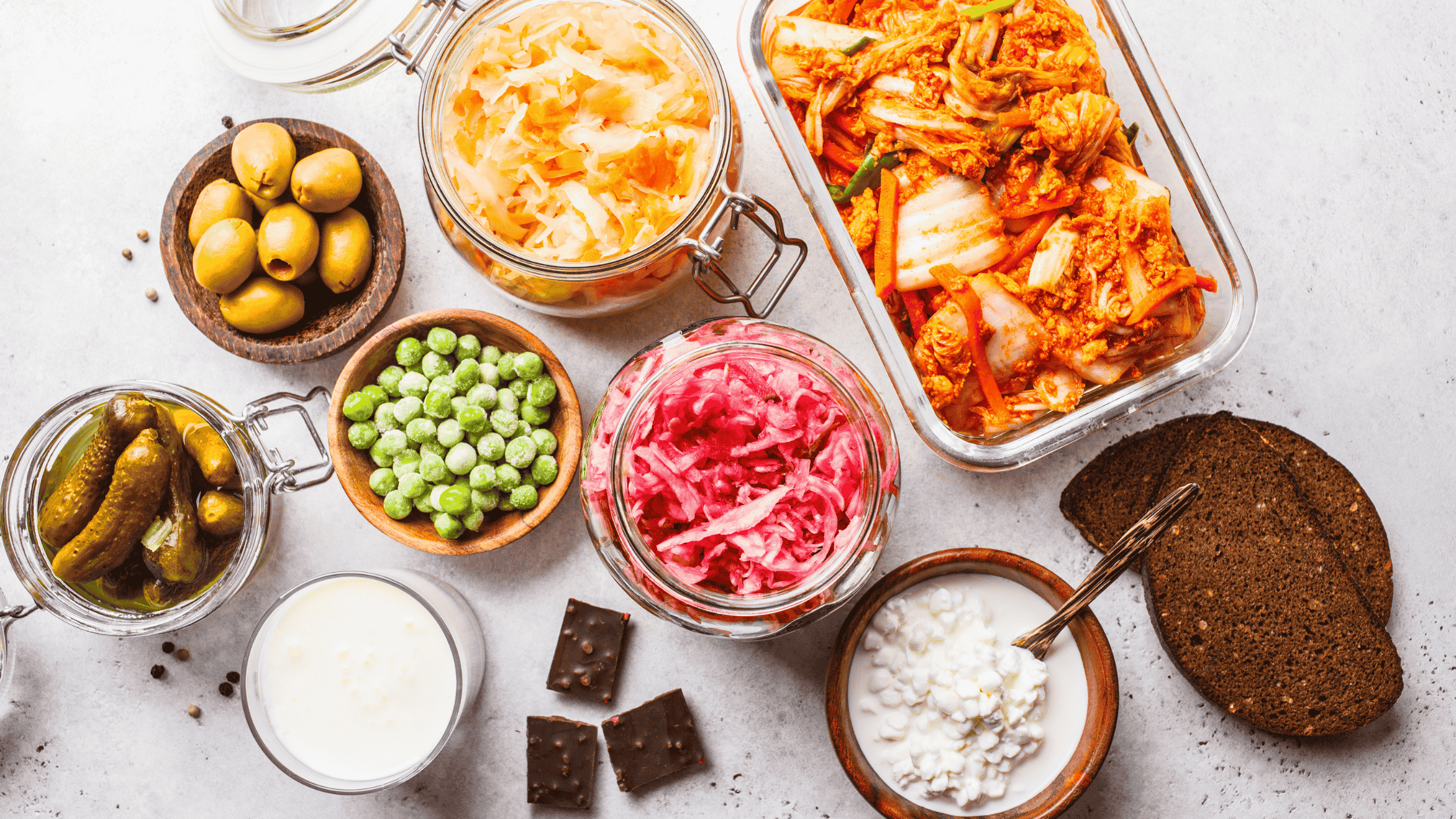
How to Feed, Support, and Care for a Healthy Gut
Your gut does a lot more than just digest food. A healthy gut is a strong link to good energy levels, mental clarity, skin health, and even hormone balance. But creating good gut health isn’t as simple as popping a probiotic and crossing your fingers.
It takes a full-body strategy to nourish your gut and support the trillions of microbes living there. From eating healthy gut foods to managing stress and toxins, there are many ways to help your gut thrive.
Let’s look at all of the ways to build and maintain a truly healthy gut.
The Microbiome: Your Inner Ecosystem
If you’ve ever wondered why gut health affects so much of how you feel, the answer lies in your microbiome. This internal ecosystem is made up of bacteria, yeasts, and other microbes that are working behind the scenes to shape your health every day.
These bugs aren’t passive bystanders; they’re involved in everything from metabolizing nutrients to helping your Immune System respond to daily stressors. They also influence your inflammation levels and even how efficiently your body produces neurotransmitters like serotonin, dopamine, and GABA.
The state of your microbiome sets the tone for how your body operates.
While taking probiotics is great, they’re just one small part of the equation. Building good gut health is about what you feed and how you care for the microbes already living in you. And when that balance is strong, your gut becomes more resilient, more efficient, and more connected to every other system in your body.
What to Eat for a Healthy Gut
When your diet includes a wide variety of healthy gut foods, you create the ideal environment for good bacteria to flourish. Here are some of the top food groups and compounds to consider.
Fermented Foods
Fermented foods like kimchi, sauerkraut, kefir, yogurt, miso, and tempeh are rich in probiotics. that temporarily boosts gut balance. While they don’t usually colonize the gut long-term, they provide a boost that works best when combined with a gut-friendly lifestyle.
Fiber-Rich Foods
Fiber is one of the most underrated tools for building a healthy gut. Foods like leafy greens, root vegetables, berries, legumes, chia seeds, and whole grains feed your microbes, especially those that produce short-chain fatty acids (SCFAs) like butyrate, propionate, and acetate.
Butyrate, in particular, is important. It’s the primary fuel source for the cells lining your colon (called colonocytes), helping to maintain gut integrity. When these cells are well-fed, they keep the gut barrier strong, preventing toxins and undigested food from slipping into your bloodstream.
The magic happens when your gut bacteria make butyrate from fiber, especially from soluble fibers found in oats, apples, carrots, flaxseeds, and legumes. The more diverse your fiber intake, the more diverse your microbiome.
Did You Know? You can also get butyrate from eating butter, particularly from grass-fed cows.
Prebiotics and Resistant Starches
Found in foods like garlic, onions, leeks, asparagus, Jerusalem artichokes, bananas (especially when slightly green), and dandelion greens, prebiotics help grow beneficial bacteria already in your gut.
Resistant starches are especially effective prebiotics. These are found in cooked-then-cooled potatoes, rice, green bananas, and legumes. They resist digestion in the small intestine, ferment in the large intestine, and fuel your butyrate-producing bacteria.
Bitter Foods
Foods with a bitter flavor, like arugula, dandelion greens, and artichoke, stimulate digestive enzymes and bile production, which can help with smoother digestion and reduce bloating.
Polyphenol-Rich Foods
Polyphenols are powerful plant compounds found in foods like berries, green tea, extra virgin olive oil, pomegranates, cranberries, and dark chocolate. Yes, we like chocolate as a healthy gut food! These antioxidants have a prebiotic-like effect, encouraging the growth of beneficial microbes and protecting the gut lining.
One standout microbe supported by polyphenols is Akkermansia muciniphila, which helps maintain the mucosal lining of your intestines. Higher levels of this bacteria are linked to better metabolic health and reduced inflammation.
Reduce Sugar Intake For Good Gut Health
It kind of goes without saying that if you’re going to put those healthy gut foods in, you also have to be wary about your refined sugar intake. Excess sugar can feed the bad microbes in your gut, throwing off the delicate microbial balance and promoting the growth of yeast, like Candida, and other potentially toxic bacteria.
Certain microbes can actually “ask” for the foods they want—by influencing your cravings. Feed the good ones the good stuff instead of sugar, and they’ll grow stronger… and crave better stuff.
This doesn’t mean you need to avoid all sugar, but focusing on whole-food sources of sweetness like fruit, dates, or raw honey, and being mindful of added sugars in packaged foods can go a long way in supporting good gut health.

Hydration Will Keep Things Moving
Drinking enough water might not be a glamorous healthy gut tip, but it’s effective.
Staying hydrated helps digestion, nutrient absorption, and supports the mucosal lining of your intestines. Dehydration can dry out this lining, allowing irritants and toxins to pass through. Plus, hydration softens stool and promotes regular bowel movements, which is key for keeping microbial waste and toxins moving out of the body.
Not a fan of plain water? Try infusing it with lemon, cucumber, or fresh herbs like mint or basil for a flavor boost that doesn’t rely on sugar or artificial sweeteners.
Quick Tip: Keep a water bottle within reach throughout the day—it’s a simple way to remind yourself to drink more! Also, try front-loading your hydration in the morning (think: 1–2 cups before coffee), and sip consistently instead of chugging all at once.
If you’re someone who drinks caffeine or alcohol, works out often, or spends a lot of time in heated or air-conditioned spaces, you may need more water than you think.

Gut-Supportive Minerals
Electrolytes—minerals like sodium, potassium, and magnesium—help your body use water effectively.
If you’ve ever struggled with sluggish digestion or irregularity, a magnesium imbalance could be part of the picture. Magnesium helps draw water into the colon, making stools easier to pass and supporting smoother digestion. It’s also involved in hundreds of enzymatic reactions throughout the body, including those that support the gut lining and reduce inflammation.
Magnesium-rich foods include leafy greens, pumpkin seeds, almonds, and avocados, but some people also benefit from targeted supplementation, especially if stress or intense workouts are draining their stores. For good gut health, pairing hydration with electrolyte balance helps your entire digestive system stay in rhythm.
You can read all about magnesium imbalance in this blog.
Stress Messes With Digestion
Yup, stress is a real pain in the Digestive System. The gut and brain are always chatting via the gut-brain axis, and when you’re under pressure, your gut knows it.
Stress—even the low-grade kind we tend to ignore—can reduce digestive enzyme output, alter gut motility, and increase gut permeability (a.k.a. “leaky gut”). It can also shift the balance of your gut microbes, giving more power to potentially harmful bacteria.
Here’s where the endocannabinoid system (ECS) comes in. The ECS is your body’s built-in regulatory system, helping to maintain balance across many processes—mood, immune response, pain, sleep, and yes, digestion. It includes endocannabinoids (naturally occurring compounds), receptors (CB1 and CB2), and enzymes that break them down.
There are ECS receptors throughout your digestive tract, and research suggests that the ECS plays a role in gut motility, inflammation, and the maintenance of the gut barrier. When you’re chronically stressed, your ECS can become dysregulated, leading to disrupted gut function and increased intestinal permeability.
Supporting your ECS can be one way to buffer your body’s response to stress and protect gut health.
Ways to support your stress levels
- Meditation, breathwork, and yoga → Calm the Nervous System and reduce cortisol output.
- Omega-3 fatty acids (like those from fatty fish, flax, or chia seeds) → Help support endocannabinoid balance.
- Adaptogens like ashwagandha and rhodiola → May help reduce stress perception.
- Healthy sleep → Both the gut and the ECS repair themselves during deep sleep.
Move Your Body to Move Your Microbes
Exercise doesn’t just help your heart and muscles; it’s fantastic for a healthy gut. Physical activity increases microbial diversity, improves gut barrier function, and keeps you regular. Even light movement can help encourage the growth of beneficial bacteria while reducing gut inflammation.
Studies show that people who exercise regularly tend to have higher levels of short-chain fatty acids (SCFAs), which we talked about earlier. So, while you may be walking for your mood or lifting weights for your bones, your gut is reaping the rewards, too.
Movement is also one of the most effective ways to keep your Lymphatic System flowing. Unlike your circulatory system, which has a pump (your heart), your Lymphatic System relies entirely on body movement to function. It’s responsible for clearing waste, toxins, and cellular debris, including from the gut. Sluggish lymph can lead to stagnant waste and immune dysfunction, which can show up as bloating, food reactivity, or even skin issues.
Aim for at least 20–30 minutes of movement daily. This doesn’t have to mean intense workouts—walking, stretching, yoga, and rebounding (mini-trampoline) all help.
Bonus – gentle movement after meals, like a 10-minute walk, can also support digestion, stabilize blood sugar, and keep things moving through the digestive tract more efficiently. We include a gentle movement video resource in our Wellness Activator, which is free with any scan purchased!
A healthy gut is a foundation for feeling your best, from your energy levels to your mood and beyond. By nourishing your microbiome with the right foods, managing stress, staying hydrated, and moving your body, you can support your gut’s overall health and maintain a balanced system.
DISCLAIMER: Balanced Health, LLC/CBH Energetics and any parent, subsidiary, affiliated or related entities and companies do not provide medical advice or services. This post and the bioenergetic products and services offered by Balanced Health, LLC/CBH Energetics including, but not limited to, bioenergetic tests, bioenergetic scans, bioenergetic reports and related products and services (collectively the “Bioenergetic Products and Services”) are designed for educational and informational purposes only and are not intended to diagnose, treat, cure, or prevent any disease, condition, complaint, illness or medical condition and are not a substitute for professional services or medical advice. Testing is not used for the purpose of obtaining information for the diagnosis, prevention, or treatment of disease or the assessment of a health condition or for identification purposes.


